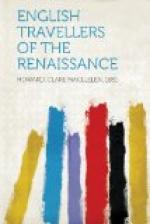Evidently, since there is so varied a need for acquaintance with foreign countries, travel is a positive duty. Noah, Aristotle, Solomon, Julius Caesar, Columbus, and many other people of authority are quoted to prove that “all that ever were of any great knowledge, learning or wisdom since the beginning of the world unto this present, have given themselves to travel: and that there never was man that performed any great thing or achieved any notable exploit, unless he had travelled."[60]
This summary, of course, cannot reproduce the style of each of our authors, and only roughly indicates their method of persuasion. Especially it cannot represent the mode of Zwinger, whose contribution is a treatise of four hundred pages, arranged in outline form, by means of which any single idea is made to wend its tortuous way through folios. Every aspect of the subject is divided and subdivided with meticulous care. He cannot speak of the time for travel without discriminating between natural time, such as years and days, and artificial time, such as festivals and holidays; nor of the means of locomotion without specifying the possibility of being carried through the air by: (I) Mechanical means, such as the wings of Icarus; or (2) Angels, as the Apostle Philip was snatched from Samaria.[61] In this elaborate method he found an imitator in Sir Thomas Palmer.[62] The following, a mere truncated fragment, may serve to illustrate both books:—
“Travelling is either:—
I. Irregular.
II. Regular. Of
Regular Travailers some be
A. Non-voluntaries,
sent out by the prince,
and
employed in matters of
1.
Peace (etc.).
2.
Warre (etc.).
B. Voluntaries.
Voluntary Regular Travailers
are considered
1.
As they are moved accidentally.




